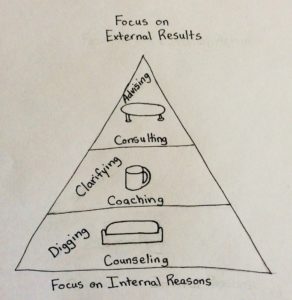
Salons have not always been known as places that specialize in hair and beauty. Once upon a time, salons were important influencers in culture and politics. The Wikipedia definition of a Salon is “a gathering of people under a roof of an inspiring host, held partly to amuse one another and partly to refine the taste and increase the knowledge of the participants through conversation.”
Influential women of the 1700s and in other periods of history would host these salons in their homes even when they had no votes and no formal power of any sort. They were inviting philosophers and artist and writers and other influencers of their time to have conversations. They would gather around food and drink and art and the host would suggest a topic to discuss. But the whole of the event centered around the beauty and transformative power of the Conversation. These women quietly, but effectively shifted culture around the intentional pursuit of powerful conversations.
The art of conversation has all but been lost in this generation. Instead of talking we are more familiar with watching passively. Instead of forming connections, we are accustomed to merely forming judgements. But people still crave the conversation. We still need it.
We don’t need just any conversation. We need to talk most about the things that scare us most. We need to come out from behind our labels and our personal branding and be honest about our struggles. We need to be open enough to utter the words, “I don’t know,” and, “Here is why I disagree with you.” Even more, we need to learn to master the art of asking great questions. Men need to get beyond the sports and shop talk and women need to go beyond wedding and baby showers. Not that there’s anything inherently wrong with showers or sports, there’s just so much more.
I have a dream that having conversations would come back in style. That gathering around real issues, real stories, and real people would happen more often. I want to see modern day salons gathering not just in the homes of wealthy women as they did centuries ago, but in coffee shops and churches and regular living rooms.
Entering into a purposeful and inspiring conversation can have a transformative effect on our lives.
Here’s five things a Real Conversation can do:
1. Conversation connects.
Addictive behaviors stem from a lack of connection. Depression is born of a lack of connection. The reason Starbucks is what it is today is not because they offer coffee. It’s because they really are in the connection and conversation business. There is nothing our human souls crave more than a face to face conversation.
2. Conversation increases the value and dignity of human beings.
People need to be invited to a “table of conversation.” They need to know that their personal experiences, their viewpoints, their voice matters. In a real conversation there is as much listening a there is speaking. There is a validation of the human experience. Studies have shown that talking about a personal experience and sharing a struggle validates that experience like nothing else can. It does more to bring healing and wholeness than many drugs or other therapies.
3. Conversation increases intelligence.
We are much smarter when we consider the opinions and experiences of others alongside our own. We are exposed to ideas we’ve never before considered and as we immerse ourselves in the conversation experience, we become more informed and more aware.
4. Conversation challenges.
Along with new information and new ideas, we find ourselves challenged with the choice of adopting new paradigms. And here’s the rub: because most people want to have better connections and they want to be more intelligent, but most people don’t want to consider that the concepts they encounter might actually demand a response to live differently, to take responsibility for a new aspect of their lives. A person who never wants to grow and change will not come back for another brave conversation. But people who are looking for growth at every turn are hungry to have the conversations that few are willing to have.
5. Conversation shifts culture.
Certain cultural buzzwords and euphemisms may annoy you. But the reality is that the use of these words was initiated by people who were invested in the conversation. If you don’t like the way that our cultural conversation is being framed, then begin having your own conversations and begin using the words that you think will make a difference. Many think that talk is cheap, but it’s only cheap when we are having counterfeit conversations. For conversation to have meaning, it must be felt, fully entered into, and fully owned. Authentic conversations are not cheap. They come at the cost of vulnerability. But Authentic Conversations change the world.
What’s the next conversation you need to have?


